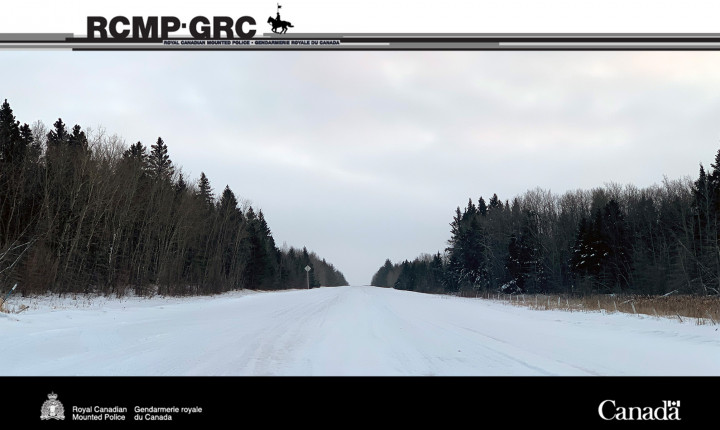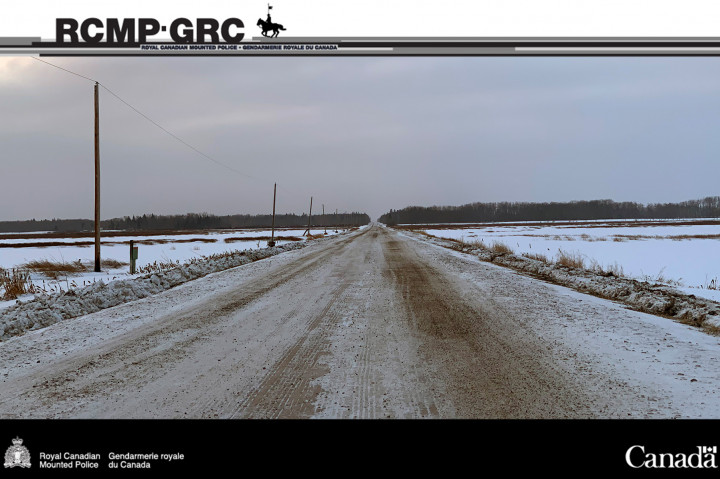While most Saskatchewan people were preparing for bed, or sitting snugly in their homes watching a television program last Monday evening, Prince Albert RCMP Detachment and RCMP Police Dog Services were running and patrolling through rural Saskatchewan hoping a search for two missing youth would end positively.
Getting the call for assistance
The call came in to Prince Albert RCMP Detachment shortly before 7:30 p.m. January 25: two teens reported missing and last seen walking away from a residence in the RM of Buckland near Prince Albert. The area is a vast network of back roads, trees and open land, combined with snow so deep in areas that if the pair had been walking through a field, it may have been waist-deep.
Cpl. Venne was the senior officer on duty and attended the scene to gather initial information and conduct preliminary searches. "Immediate response to these types of calls is very important. We need to gather as much information as we can from the onset, so we can measure severity and urgency of our response. Simple things like checking the immediate area and outbuildings first is very important. We need to exhaust our efforts on the ground and then call in additional resources. If we call Police Dog Services, we need to know the last known location and track of the lost person, without contaminating the track ourselves, and create an area so the Police Service Dog can do their work."
Cpl. Venne and five other Prince Albert RCMP officers were assigned to the search, some who were called in from being off-duty. Detachment Operations Officer Sgt. Molle and North District Management S/Sgt. Lohrenz coordinated search efforts and Police Dog Service Team Cpl. Drohomereski and Lux traveled from their home unit to offer specialized tracking skills.
The freezing cold: a very real threat
The forecast was – in a word – extreme. With an ambient temperature of -35 degrees Celsius and -45C factoring in wind chill, the officers knew they had to act fast.
"In my 19-year career I've participated in countless similar cold-weather calls," shares Cpl. Venne of Prince Albert RCMP Detachment. "Living my whole life and working in Northern Saskatchewan and the Northwest Territories has made me acutely aware of the severity of weather when it comes to calls for service. I have been a part of investigations where people have perished due to hypothermia and I have also been lucky enough to have saved others. Once a person becomes hypothermic, their actions and decision-making process can become erratic and might not make sense. A call for service may start as one thing, then turn into something entirely different."
"Everything that had to be deployed, had to be deployed within a very short time period. Any delay could mean the increased possibility of a tragic outcome," explains Sgt. Molle. "The weather is draining – you're outside for hours. We all carry different things in a cold weather kit we have with us to ensure we have the supplies we need to push through a serious call that may last a long time."
"Responding to calls for service in remote areas in the winter can present a risk to the safety of those we are trying to help and the officers who are working diligently to provide assistance in dangerous conditions. We need to be prepared for those calls," says Cpl. Venne. "We need to be properly dressed and prepared to be outside for an extended period of time – if we are not prepared and cannot stay outside, we cannot help the people who need us."
As a team, Police Dog Services works in all environments and trains in those same environments. "Our dogs are conditioned and the weather does not effect them during a call," explains Cpl. Drohomereski. "We are always stocked with supplies so we're ready for anything – extra food for us and our Police Service Dog, extra clothing for all situations, tents, cots, snowshoes…the list goes on. As a general rule I try to have enough supplies on hand to deploy for seven days, should the need arise."
"Travel those back roads"
"You question everything: were (the pair) still on foot? Did they get a ride from someone? Where were they headed? Where are we looking, which direction? Where aren't we looking that we should be looking?" says Sgt. Molle, "I relayed to the officers on the ground to travel those back roads because that's where we're likely going to find them."
S/Sgt. Lohrenz was busy thinking about the pressing needs of officers, "Are there sufficient human resources in place to safely handle the incident as its unfolding? What are the contingencies in place for maintaining capacity? We think about all those things as the search evolves."
"There's a massive behind-the-scenes undertaking happening," says Sgt. Molle. "Making phone calls and making sure our officers have what they need, when they need it. What was crucial was the team thinking ahead, right from the start, considering all possibilities – which is exactly what they did. That first response is critical."
A massive support system: working with RCMP units and partner agencies
"Working with our partners is essential," says S/Sgt. Lohrenz. "In many cases we bring RCMP assets to the table, but there are times where our partners have a specialized, invaluable resource. In this case, complications included obtaining aircraft support to operate at night which involves the need for highly specialized equipment and personnel trained to operate and use it. The dedicated members of Saskatoon Police Service were very quick to engage and willing to help, which was going to be critical for getting a wide aerial view of the search area."
"If we need to call in a search team or airplane, we need to know the last known location and create a search radius. We need to know the last known location," explains Cpl. Venne.
Prince Albert Police Service were notified of the two missing individuals in the event the pair caught a ride into the city. The RCMP Search and Rescue Team was waiting for the go ahead to deploy a search team and was beginning to consider the use of snowmobiles, equipment, supplies and other resources. The Search and Rescue Team Commander was focused on the longer search efforts in the event the pair were not located initially.
"While we were en route to the scene, I was working with officers over the radio to bring in additional resources," shares Cpl. Drohomereski. "When we arrived, I had detachment officers take me and Lux to the last point where the youths were seen and we started our job from there."
Have you ever ran with a searching Police Service Dog?
Two officers were assigned to run with the Police Dog Services team and another was nearby in a vehicle communicating on the radio and providing a space to warm up or rest/switch off when needed. "You never know if you will be running with a Police Dog Services team for twenty minutes or two hours, which is another reason being prepared for any situation is so critical," says Sgt. Molle. "Bear in mind it's not like being out for a regular jog – you're encountering hills, trees, snow, ice, plus you still have your policing equipment on."
"Snow does actually make it easier for our dogs in the woods," shares Cpl. Drohomereski, "Even though they're trained to use their nose to locate a person, a dog can 'cheat' in the snow and use their eyes to assist by looking for the track."
Lux led officers inside the bush line, parallel to the roadway. The tracks were headed towards the City of Prince Albert so efforts were concentrated on all probable roads leading in that direction.
Success and relief
Just as the Saskatoon Police Service pilot was taking off from Saskatoon, a positive outcome was about to unfold on the ground near Prince Albert.
The pair were located at 10:15 p.m. – nearly three hours after the initial call for assistance. Officers searching back roads in their vehicle spotted them ten kilometers from where they were last seen on a gravel road just north of the city. "They were nowhere near a main road and not in a particularly well-travelled area, especially at that time of night," tells Sgt. Molle. "One of our officers was out there specifically traveling those back roads and that's how we thankfully came across them."
They were dressed in ski pants and coats, but were not wearing proper footwear. Although cold, the pair were safe. "They were quite happy to get inside a warm vehicle and be driven home," says Cpl. Venne.
"Time was not our friend"
"I'm not sure a member of the public understands the process that police officers have to think through in these situations, the amount of resources called upon and required to protect lives and the preparedness of our front line officers," shares Cpl. Venne. "I wish I could have snapped a photo of our officers that night running with the police dog, everyone bundled up, covered in frost, rosy cheeks and all."
"The officers went the extra mile," says S/Sgt. Lohrenz. "Time, paired with the extreme temperature, was not our friend in this case. I think it's important for the public to know the visible presence of officers does not provide the complete picture of resources and expertise put in place during situations like this."
Cpl. Drohomereski wants everyone to know that Lux is trained to do exactly this type of work. "Police Service Dogs do not look at their tasks as jobs; everything we do, the dog thinks it's a fun game and always wants to do more. They're excited to go to work if it's hot, cold, Monday or Friday, two in the morning or three in the afternoon. They want to do what they do best."
Did time pass slowly or quickly while this incident unfolded? "It is what it is, it's difficult to answer that question," recalls Sgt. Molle, "You work through it methodically, meticulously. You hope for the best outcome – which thankfully happened that night. Sadly, that isn't always the case."
And the work didn't stop when the youth were found safe. Officers stayed at the detachment for hours afterwards, finishing up paperwork and making calls. Others continued their shift - attending calls for service, helping the public and keeping their community safe.

